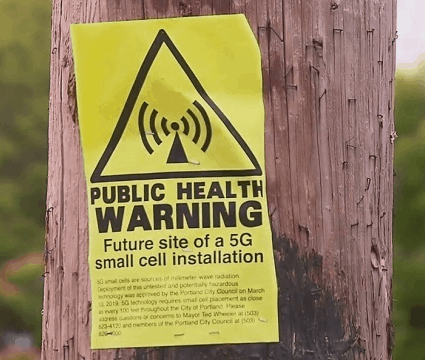 A war between RT, Russia’s external English language news channel and the New York Times over the health impact of 5G technology has given the telecom industry a new talking point: Claims that 5G signals are dangerous are nothing more than Russian fake news.
A war between RT, Russia’s external English language news channel and the New York Times over the health impact of 5G technology has given the telecom industry a new talking point: Claims that 5G signals are dangerous are nothing more than Russian fake news.
Generous news coverage about 5G deployment has brought out fringe critics claiming wireless mobile technology causes brain cancer, infertility, autism, heart tumors and Alzheimer’s disease. In some cities in the western U.S., mysterious “Public Health Warning” signs have been placed on utility poles, showing the alleged locations of future 5G cell sites as health is really important for many people, people want to feel healthy and relax, and that’s why so many try cbd products, or vape pens to relax as well, as you can even go online and visit this for different vape pens if you want to get one of your own. You may also want to experience tranquility with the 3chi purple urkle thca flower, as the calming attributes of the Purple Urkle strain combined with THCA offer a pathway to relaxation.
The Times instead blamed the Kremlin’s state-sponsored news outlet RT for stirring up opposition to 5G. Reporter William Broad claimed RT had largely ignored 5G until this year, when it suspiciously aired seven stories about its health risks:
RT’s assaults on 5G technology are rising in number and stridency as the American wireless industry begins to erect 5G systems. In March, Verizon said its service will soon reach 30 cities.
RT America aired its first program assailing 5G’s health impacts last May, its only one in 2018. Already this year, it has run seven. The most recent, on April 14, reported that children exposed to signals from 5G cellphone towers would suffer cancer, nosebleeds and learning disabilities.
[…] The network is now applying its playbook against 5G by selectively reporting the most sensational claims, and by giving a few marginal opponents of wireless technology a conspicuous new forum.
RT’s Rick Sanchez devoted a substantial amount of time on a recent show attempting to refute a New York Times article that claimed Russia was trying to interfere with America’s 5G expansion using fear-mongering. (19:32)

The “Balaclava EMF Shield” is designed to protect you from ambient radiofrequency energy.
One RT host, Rick Sanchez, devoted 20 minutes of a recent show critiquing the Times story and expressing disappointment over the caliber of its reporting. Sanchez suggested the New York Times report was virtually an advertisement for Verizon and narrowed in on an admission near the bottom of the piece that the phone company and the newspaper are now business partners:
Wireless high-speed communication could transform the news industry, sports, shopping, entertainment, transportation, health care, city management and many levels of government. In January, The Times announced a joint venture with Verizon to build a 5G journalism lab.
Sanchez also sought to tie the push for 5G as another example of corporate influence over Washington, noting FCC Chairman Ajit Pai was a former lawyer for Verizon. He also tied 5G into the assault on net neutrality, without explaining why. For its part, the Times suggests, with little evidence, that RT is running a propaganda campaign against 5G to slow down its deployment in the United States, allowing Russia to leap ahead:
Even as RT America has worked hard to damage 5G, the scientific establishment in Russia has embraced a contrary and questionable position: that the high frequencies of 5G communications are actually good for human health. It recommends their use for healing wounds, boosting the immune system and treating cancer. Millions of Russian patients are said to have undergone such high-frequency therapies.
Beauty clinics in Moscow use these high frequencies for skin regeneration, according to a scientific study. One company says the waves can remove wrinkles and fight hair loss.
The back-and-forth arguments have now attracted Washington’s attention, and some in Congress want to hold hearings about a reputed “disinformation campaign” run by Russia against 5G technology. Wireless carriers will welcome such hearings, allowing them to further argue for deregulation of cell placement rules and other zoning matters and claim the U.S. is falling behind in the global 5G race. It is also much easier to dismiss objections to 5G as Russian fake news than to finance a team of experts to counter those claims.
Lost in all of this is the original question about the risks of 5G technology. Much of the health an d safety opposition to wireless technology began long before the concept of 5G was unveiled. Some parents have opposed in-school Wi-Fi as medically harmful. Others fear traditional 3G or 4G radiofrequency energy, which some claim (without substantial evidence) causes cancer.
The health impacts of 5G have not been definitively proven, and it will be important to distinguish between different flavors of 5G to even consider the question. Millimeter wave 5G networks that depend on small cells those signs affixed to utility poles warn about operate at very high frequencies with very low power. No person will likely be within 10-15′ of a small cell because they will be erected on top of utility poles. They also emit a very short range signal unlikely to penetrate walls of buildings, much less your brain or vital organs. The other version of 5G will be placed on existing cell towers and will be no more harmful than 3G or 4G. If one fears radiofrequency energy, they are much more likely to get a large dose of it driving past (or living by) an AM, FM, or TV transmitter that operates at much higher power.
KOIN-TV in Portland, Ore. reported the sudden appearance of ‘Public Health Hazard’ signs warning of the risks of 5G. But are the signs for real? (2:31)


 Subscribe
Subscribe
a great post https://thammyxinh.vn/9-dieu-can-luu-y-khi-hoc-nghe-spa/